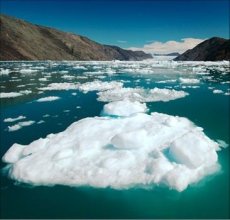New publications
Arctic ice melt rate will break records in a few days
Last reviewed: 01.07.2025

All iLive content is medically reviewed or fact checked to ensure as much factual accuracy as possible.
We have strict sourcing guidelines and only link to reputable media sites, academic research institutions and, whenever possible, medically peer reviewed studies. Note that the numbers in parentheses ([1], [2], etc.) are clickable links to these studies.
If you feel that any of our content is inaccurate, out-of-date, or otherwise questionable, please select it and press Ctrl + Enter.

"This weekend, the volume of ice in the Arctic Ocean will reach a record low. The reason for this phenomenon is the serious changes that have befallen the climate of our planet. They quite eloquently testify to the fact that the developing global warming, which was provoked by man-made activities, is of great and truly important significance, in particular for the Polar region," such a message was published in the authoritative British publication The Guardian.
According to information provided by the head of the environment department of The Guardian newspaper, John Vidal, the melting of Arctic ice this year is happening at an unprecedented rate, which can reach more than 100,000 square kilometers per day. It is predicted that if the rate of melting of Arctic glaciers does not decrease, then in a few days it will be able to approach the record figure observed in 2007. These disappointing data have already been confirmed by scientists from such countries as Denmark, Norway, Japan and Germany.

Scientist Julien Stroeve of the National Snow and Ice Data Center in Colorado, USA, gave an interview to The Guardian, in which he emphasized: "Unless something truly extraordinary happens, we may soon see the 2007 record broken." It is expected that this event could well happen even this weekend and almost certainly next week.
In the last few days alone, the Arctic has been losing its ice cover at a truly incredible rate - 100,000 square kilometers in one day. This in itself is a record for August. In addition, it should be noted that nature is actually undergoing fairly rapid changes - added Julien Stroeve.
- The energy balance in which the Arctic was located is currently undergoing significant changes, - the scientist continues to inform. There is a steady increase in temperature indicators in this area. The climate is changing, and we are losing more and more seasonal ice. According to calculations made by Julien Stroeve, by about 2050 the ice cover in the Arctic may disappear altogether.
In addition, the American scientist shared his observations: Some 15 years ago, I did not even imagine that I would ever be able to witness such serious changes in the climate. And, probably, no one expected such a rapid development of events. The season during which the Arctic ice melts has now become much longer. 20 years ago, it lasted about a month. Now, this same process takes as much as 3 months. Let me give you an example. Last week, the temperature in the Arctic was at 14 degrees Celsius. Which in itself is considered quite high for this area.
